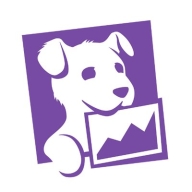

Datadog and ChaosSearch compete in the data monitoring and analysis market. Datadog's comprehensive features and detailed analytics give it an upper hand in delivering strong value, while ChaosSearch's efficient data indexing offers advantages in scalability.
Features: Datadog offers detailed analytics, real-time performance monitoring, and extensive integration options, making it a robust choice for tech buyers seeking comprehensive monitoring capabilities. ChaosSearch stands out for its powerful indexing capabilities, seamless log management, and excellent scalability. Unlike Datadog's feature-rich environment, ChaosSearch specializes in handling large datasets efficiently, highlighting its scalability strength.
Ease of Deployment and Customer Service: Datadog's straightforward cloud-based deployment and robust customer support provide significant advantages for users. ChaosSearch, also cloud-based, emphasizes efficient data handling with a simpler deployment process, though its customer service offerings are less extensive. Datadog's ease of use and strong support give it an edge, while ChaosSearch remains appealing for users focused on quick and efficient data handling.
Pricing and ROI: Datadog involves higher upfront setup costs but offers significant ROI through its extensive features and integrations. ChaosSearch provides a more cost-effective initial setup, focusing on reducing data storage expenses and offering an attractive ROI for budget-conscious buyers. While Datadog's pricing is premium, delivering comprehensive functionalities, ChaosSearch offers an economical solution complemented by scaling benefits.
| Product | Market Share (%) |
|---|---|
| Datadog | 4.4% |
| ChaosSearch | 0.3% |
| Other | 95.3% |

| Company Size | Count |
|---|---|
| Small Business | 80 |
| Midsize Enterprise | 46 |
| Large Enterprise | 99 |
ChaosSearch boosts organizational data management and analysis, excelling in log analysis, cost-efficient data storage, and security analytics. Key features include managing vast data volumes, scalability, and a user-friendly interface, enhancing decision-making and efficiency across diverse industries without heavy infrastructure investments.
Datadog integrates extensive monitoring solutions with features like customizable dashboards and real-time alerting, supporting efficient system management. Its seamless integration capabilities with tools like AWS and Slack make it a critical part of cloud infrastructure monitoring.
Datadog offers centralized logging and monitoring, making troubleshooting fast and efficient. It facilitates performance tracking in cloud environments such as AWS and Azure, utilizing tools like EC2 and APM for service management. Custom metrics and alerts improve the ability to respond to issues swiftly, while real-time tools enhance system responsiveness. However, users express the need for improved query performance, a more intuitive UI, and increased integration capabilities. Concerns about the pricing model's complexity have led to calls for greater transparency and control, and additional advanced customization options are sought. Datadog's implementation requires attention to these aspects, with enhanced documentation and onboarding recommended to reduce the learning curve.
What are Datadog's Key Features?In industries like finance and technology, Datadog is implemented for its monitoring capabilities across cloud architectures. Its ability to aggregate logs and provide a unified view enhances reliability in environments demanding high performance. By leveraging real-time insights and integration with platforms like AWS and Azure, organizations in these sectors efficiently manage their cloud infrastructures, ensuring optimal performance and proactive issue resolution.
We monitor all Log Management reviews to prevent fraudulent reviews and keep review quality high. We do not post reviews by company employees or direct competitors. We validate each review for authenticity via cross-reference with LinkedIn, and personal follow-up with the reviewer when necessary.